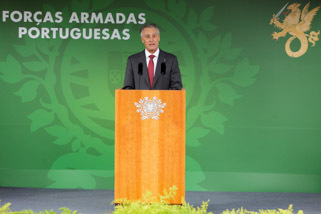
I am greatly honoured by being received in the Shanghai University for International Studies, following the kind invitation sent me to preside at the closure of this Seminar, a joint initiative of the Shanghai University for International Studies and of Camões – Language and Cooperation Institute. I equally want to thank you for the warm hospitality with which this academic community received the Portuguese delegation that accompanies me in this State Visit to China.
The excellence of the speakers in this conference has particularly enriched our reflections on a very contemporary topic. I have recently shown special interest in the central issue of this conference, «The value of languages». In my several contacts in Portugal and abroad, I have endeavoured to emphasize the value of language learning and, especially, the importance and potential of the Portuguese language.
Spoken Portuguese, or “lusophony” as it is now becoming known, whilst active in Portugal and throughout the World, is one of our country’s strategic values. In this context, language and culture must be faced as two vectors that are mutually reinforced. Language is the vehicle of a culture: a culture which, in its richness and diversity, reflects the language’s consistency.
Due to the fact that this language is shared by different countries and cultures, in several continents, Portuguese is currently overlaid by a cultural, economic and geopolitical added value. However, the potential of Portuguese language is not an entirely new reality.
The truth is that, for centuries, Portuguese was the business language in Africa and Asia. It was, equally, an important vehicle of knowledge. In this first globalization, the Portuguese language also showed the capability to become a communications tool between peoples with widely diverse visions of the world. Thus, 500 years ago, Portuguese became a global language.
The Portuguese language thus retains this plural feature, daily enriched in the streets of Lisbon, Brasilia, Maputo or Dili. As the official language of approximately 250 million people, Portuguese is one of the languages with the greatest expansion in the World, one of the most used in the Internet. It is important to underline that Portuguese is the mainly spoken language in the southern hemisphere. Simultaneously, it is an official language in several international organizations, including the European Union, the African Union and the Iberian American Community. The global dimensin of Portuguese is equally reinforced by the Diasporas of the several countries where Portuguese is the spoken language.
In the Portuguese Presidency of the Portuguese Speaking Countries, the choice of the topic “Portuguese Language: Common Heritage, Global Future”, for the Summit held in Lisbon, in 2008, endeavoured to launch a reflection on the joining of efforts to pursue policies that internationally project the Portuguese language. This was where the path was planned towards the adoption of the Brasilia Action Plan and, more recently, of the Lisbon Action Plan, which established a set of strategies for the promotion and dissemination of the Portuguese language. The Lisbon Action Plan established two large fields of incidence: Portuguese language in the strengthening of entrepreneurialism and economic creativity; and Portuguese language in scientific development and innovation.
In effect, within the context of contemporary globalization, language must be valued, particularly when it is also considered as a competitive advantage. The interest that the learning of Portuguese arises in China is thus understandable, due the very high level of employability that its knowledge guarantees in this Country.
Universities have more than ever been shown to be privileged promoters of the international projection of Portuguese language and culture. In this context it is naturally fit to emphasize the importance of the cooperation between Portuguese and Chinese academies, in the most diverse areas of knowledge.
The prestigious Shanghai University for International Studies has become distinguished due to the dynamism it has placed on cooperation with several outstanding Portuguese universities, setting up extensive and useful knowledge networks. Placing a stake in a Centre of Portuguese Studies and the promotion of initiatives such as the conference now being closed evidence the role enjoyed here by the Portuguese language and its recognized potential.
I highly salute these initiatives and, particularly, the organization of this conference, due to its great success. My wishes are that this Seminar, with such a high academic level, strengthens the growing interest in issues related to the value of languages and, particularly, allow me to underline it, in the strategic value of the Portuguese language.
Thank you very much.
Xié, xié.
© 2006-2016 Presidency of the Portuguese Republic
You have gained access to the records of the Official Site of the Presidency of the Republic from 9 March 2006 to 9 March 2016.
The contents available here were entered in the site during the 10 year period covering the two mandates of President of the Republic Aníbal Cavaco Silva.